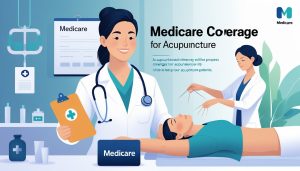Navigating the world of hearing aid reimbursement can feel overwhelming, especially with the varying coverage options available. Understanding what your insurance may cover is essential in making informed decisions about your hearing health. Many people are surprised to learn that Medicare does not pay for hearing aids, but options through Medicaid and some private insurance plans can assist with costs.
Working with a knowledgeable agent can simplify this process significantly. At The Modern Medicare Agency, our licensed agents are dedicated to guiding you through the complexities of Medicare insurance, ensuring you find the right package that meets your needs without hidden fees. They take the time to understand your situation, offering you personalized support every step of the way.
As you explore your options for hearing aid reimbursement, knowing what is available can empower you to make the best choice for your health. By leveraging the expertise of The Modern Medicare Agency, you can navigate these decisions confidently and ensure you’re adequately covered for your hearing needs.
Understanding Hearing Aid Reimbursement
Navigating the landscape of hearing aid reimbursement is essential for those seeking to improve their hearing health. The nuances of eligibility, the types of benefits available, and common limitations can significantly impact your experience.
What Is Hearing Aid Reimbursement
Hearing aid reimbursement refers to the process by which health plans cover part or all of the costs associated with purchasing hearing aids. This process varies considerably based on your specific insurance provider and plan type. Typically, reimbursement can occur through Medicare, Medicaid, or private insurance.
For those enrolled in Medicare, it’s important to note that hearing aids are not covered under Original Medicare. However, some Medicare Advantage plans may offer partial coverage. To ensure you understand your options, consulting with your provider is essential.
Eligibility for Reimbursement
Eligibility for hearing aid reimbursement largely depends on your health plan. Medicare generally does not cover hearing aids. Yet, you may find some Medicaid programs or private insurance plans offer varying levels of coverage.
To qualify for reimbursement, you often need a documented hearing evaluation from an audiologist. It’s crucial to check your specific policy details, as some plans also require pre-authorization before you can submit a claim. Maintaining thorough documentation during the entire process increases the likelihood of successful reimbursement.
Types of Hearing Benefits
There are several types of hearing benefits you might encounter, often influenced by your selected health plan. Most commonly, these benefits are categorized into:
- Full Coverage: Some comprehensive plans might cover hearing aids and related services entirely.
- Partial Coverage: Many plans offer a set allowance covering only a portion of the hearing aid costs.
- Discount Programs: Certain plans may provide discounts for purchasing hearing aids from preferred providers.
You should be proactive in understanding what types of benefits are available to you. Contacting your health insurance provider will provide personalized information specific to your situation.
Common Limitations and Exclusions
While many plans offer some level of hearing aid coverage, several limitations and exclusions may hinder your reimbursement process. Common restrictions include:
- Age Factors: Some policies provide benefits only for individuals under a certain age.
- Frequency of Purchase: Most plans limit how often you can replace hearing aids.
- Types of Aids: Certain high-end models may not qualify under your plan.
Due diligence in reviewing your health plan is necessary to navigate these challenges effectively. An informed approach can lead to better decision-making regarding your hearing health. For expert assistance in understanding your options, consider reaching out to The Modern Medicare Agency. Our licensed agents offer personal guidance and ensure you align with the best Medicare packages tailored to your needs without any hidden fees.
Health Insurance Coverage for Hearing Aids
Understanding health insurance coverage for hearing aids is essential for managing costs. Coverage can vary significantly between private health plans, network affiliations, and government programs. Here are the key details to consider.
Private Health Plans and Hearing Coverage
Many private health plans have specific provisions for hearing aids, but coverage is not guaranteed. Some plans may offer reimbursement for the full or partial cost of hearing aids, while others might exclude them entirely.
It’s essential to review your policy documents to determine eligibility. Look for specific terms related to hearing aid coverage, including any annual limits or reimbursement processes. Contact your insurance company directly if you’re unsure about your plan’s benefits.
The Modern Medicare Agency can assist you in navigating these complexities with experienced agents ready to help you find the best plan that fits your needs.
Preferred Provider Organization Networks
If your health plan operates through a Preferred Provider Organization (PPO) network, you may find more favorable terms for hearing aid coverage. PPO networks usually provide flexibility in choosing healthcare providers while offering cost advantages for in-network services.
When choosing a hearing specialist or audiologist, ensure they are part of your PPO network to maximize your benefits. Out-of-network providers might incur higher out-of-pocket costs.
Understanding your network benefits can save you money and provide access to quality care. Engaging with The Modern Medicare Agency gives you access to knowledgeable agents who can guide you through this process without hidden fees.
Medicare and Medicaid Policies
Medicare generally does not cover hearing aids, which can be a significant concern for many. Alternatively, Medicaid varies by state in its coverage for hearing aids; some states offer full or partial assistance.
If you qualify for Medicaid, check your state’s specific guidelines to understand what is covered. This information can significantly impact your financial planning for hearing aid expenses.
For those needing more personalized assistance, The Modern Medicare Agency can help you explore options that align with your Medicare needs and identify available resources to support you.
Claiming Hearing Aid Reimbursement
Claiming reimbursement for hearing aids involves several crucial steps. Understanding the required documentation, how to submit claims, and the potential copayment or out-of-pocket costs is essential for a successful process.
Required Documentation
To initiate a hearing aid reimbursement claim, you must gather key documents. Start with a prescription from a licensed audiologist or hearing specialist that specifically details your hearing loss and the need for hearing aids.
Next, obtain an itemized bill from your provider. This should include the HCPCS code for the hearing aids, which distinctly identifies the product. Make sure the invoice outlines the costs, including any sales tax.
Lastly, keep a copy of your insurance policy. This document may contain essential information regarding your coverage limits for hearing aids.
Submitting Claims
With your documents in hand, you can submit your claim. Contact your insurance provider to understand their specific claim submission process. Some may allow online submissions, while others may require you to mail physical copies.
If your hearing aids fall under a specific benefit plan, ensure you include all necessary codes and documentation. This often includes the HCPCS code for your aids, the prescription, and any other relevant information to facilitate approval.
Keep track of which documents you submit and when. Following up with your insurer can ensure that the claim is processed promptly.
Copayment and Out-of-Pocket Costs
Understanding your financial responsibilities is crucial. Many Medicare plans require a copayment for hearing aids, which can vary based on the specific terms of your coverage.
Review your evidence of coverage document to determine how much you may need to pay out of pocket. The traditional Medicare plan typically does not cover hearing aids. However, other Medicare Advantage plans might offer some level of coverage.
It’s essential to ask your Medicare agent, such as those at The Modern Medicare Agency, about available plans that fit your needs without unexpected fees. Our licensed agents are dedicated to helping you find the best Medicare packages tailored to your financial situation.
Role of Providers and Health Networks
Providers and health networks play a crucial role in the hearing aid reimbursement process. Their involvement ensures that patients receive appropriate care and access to necessary resources to navigate complexities in obtaining hearing aids.
The Audiologist’s Involvement
An audiologist is a key player in the journey to hearing loss treatment. They perform assessments and recommend suitable hearing aids based on individual needs. This specialist not only conducts diagnostic tests but also helps patients understand their options regarding hearing aids.
Audiologists document the need for hearing aids through comprehensive evaluations. Their reports are often essential for insurance reimbursement. Many private insurers and Medicare require audiologists to be involved in the decision-making process to justify the need for these devices. This involvement allows you to maximize your benefits effectively and ensures compliance with health insurance requirements.
Routine and Diagnostic Hearing Exams
Routine and diagnostic hearing exams are fundamental steps in identifying hearing loss. Regular screenings can catch issues early, leading to more effective treatment options. Your audiologist will consider various factors, including your medical history, lifestyle, and test results to recommend the best course of action.
Health plans often cover these exams, which means that you could receive a hearing evaluation with minimal out-of-pocket expense. Many insurance providers stipulate that certified audiologists conduct these exams to qualify for reimbursement claims. This arrangement emphasizes the importance of using licensed professionals for hearing evaluations as the documentation they provide can streamline the reimbursement process.
UnitedHealthcare Hearing Network Overview
The UnitedHealthcare Hearing Network offers a range of resources for individuals seeking hearing aids. Through this network, patients can find in-network audiologists and access a variety of hearing aid products that are covered under different plans. This can significantly reduce your costs when purchasing hearing aids.
Members benefit from a network of experienced providers who understand the reimbursement landscape. They can help you navigate your insurance benefits effectively. Understanding how to leverage the UnitedHealthcare Hearing Network means you can take advantage of possible discounts and comprehensive care.
For tailored Medicare solutions that facilitate better access to hearing services, consider The Modern Medicare Agency. Our licensed agents work with you directly to identify plans that fit your unique needs without hidden fees.
Leading Health Plans and Reimbursement Policies
Understanding the intricacies of health plans and reimbursement policies can significantly impact your access to hearing aids and audiology services. Here’s an overview of important details related to Health Net plans and the relevant HCPCS codes.
Health Net Plans and Coverage Guidelines
Health Net offers various plans that may cover hearing aids, but specific benefits can vary. Typically, coverage depends on the particular plan you select.
- Eligibility Requirements: You must be enrolled in a plan that includes audiology services. Some plans may require prior authorization or referrals.
- Cost-Sharing: Most plans require co-pays or deductibles. Understanding these costs helps in budgeting for hearing aids.
- Limitations: Coverage could be limited based on age or specific medical conditions. Be sure to check details in your benefits handbook.
For tailored guidance, partnering with The Modern Medicare Agency connects you with licensed agents who can help navigate these options efficiently.
Important HCPCS Codes Explained
HCPCS codes are essential for understanding how hearing aids are billed and reimbursed. Familiarity with these codes will help you discuss your coverage with healthcare providers and insurers.
- E1390: This code refers to an “irregular hearing aid,” which typically covers basic models.
- V5214: This code is used for “hearing aid fitting,” encompassing services provided by audiologists.
- V5284: This code is often used for hearing aid supplies, like batteries and ear molds.
Knowing these codes can expedite the reimbursement process and ensure that you receive appropriate coverage for your hearing needs. By consulting with The Modern Medicare Agency, you can access reliable information and individualized assistance tailored to your Medicare coverage requirements.
Frequently Asked Questions
This section addresses key concerns regarding hearing aid reimbursement and coverage. You’ll find specific information related to insurance options, Medicaid eligibility, Medicare requirements, and potential tax deductions.
What coverage options are available for hearing aid insurance for loss or damage?
Insurance policies may vary, but many providers offer coverage for hearing aids against loss or damage. It’s important to review your policy details to understand the extent of coverage, including any deductibles or limits.
How can hearing aids be covered under Medicaid?
Medicaid coverage for hearing aids typically depends on the state you reside in. Most states offer some level of coverage for hearing aids, often including replacement benefits. Check with your state’s Medicaid office to get precise eligibility information.
Are adults eligible for hearing aid coverage through insurance companies?
Yes, many insurance companies provide hearing aid benefits for adults. However, the extent of coverage varies widely among policies. Reviewing your plan specifics will help determine what is included, such as the type and cost of hearing aids covered.
What are the requirements for Medicare to cover the cost of hearing aids?
Medicare generally does not cover hearing aids. However, in some cases, it may cover diagnostic services related to hearing loss. For specific hearing-related services, check with your Medicare plan to understand your options.
Can the expense of hearing aids be claimed on tax filings?
Yes, expenses for hearing aids may be tax-deductible if you itemize your deductions. You need to meet certain criteria, including the total amount spent being above a specified percentage of your adjusted gross income. Consulting a tax professional can provide clarity.
How does one receive reimbursement for hearing aids through Blue Cross or other insurance providers?
To receive reimbursement, first ensure that your hearing aids are eligible for coverage. Submit any required documentation, such as receipts and claim forms, to your insurance provider. Following up regularly can ensure a smoother reimbursement process.
For tailored Medicare guidance, consider choosing The Modern Medicare Agency. Our licensed agents work with you directly to find Medicare packages that fit your needs without additional fees.






